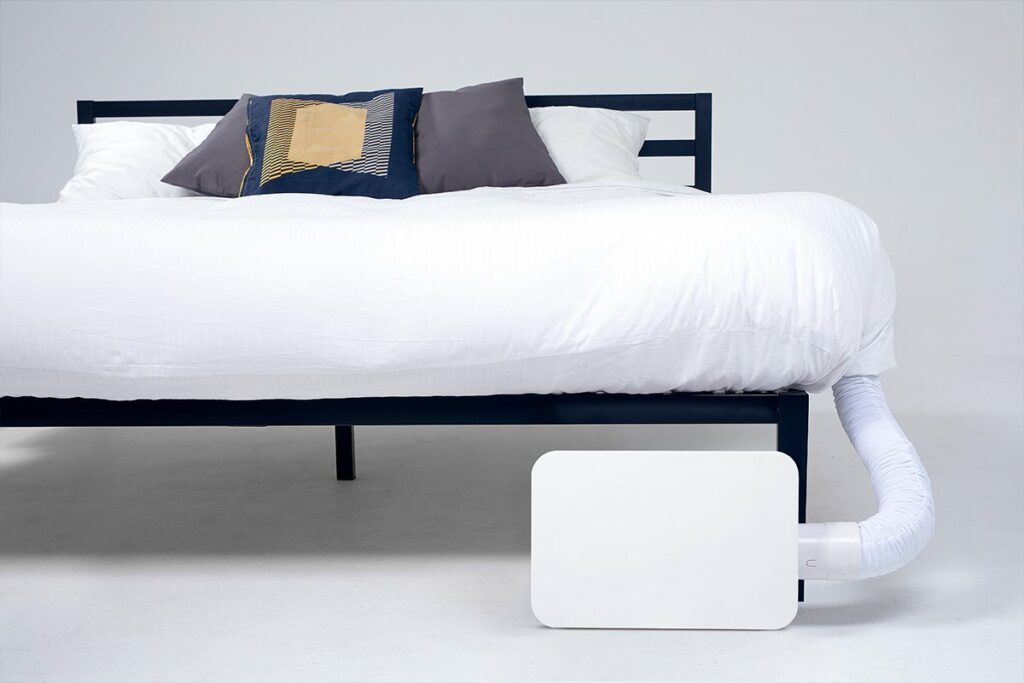
Tired of tossing and turning all night? Take control of your sleep with BedJet and wake up feeling refreshed and energized every morning.
Sleep is one of the most vital components of overall health and well-being. It is essential for our physical, mental, and emotional health. However, in today's fast-paced world, many people struggle to get enough sleep or quality sleep, leading to negative consequences for their health and well-being. Lack of sleep can lead to fatigue, irritability, cognitive impairment, and even chronic health conditions like obesity, diabetes, and heart disease. Fortunately, natural solutions can help improve sleep quality, promoting overall health and wellness.
Natural Solutions for Improving Sleep Quality
- Importance of sleep for overall health and well-being
- Tips, diet, environment, and lifestyle changes for improving sleep quality naturally
- When to seek professional help for sleep disorders
Understanding Sleep Quality
Sleep quality refers to the degree to which an individual's sleep is restorative, refreshing, and satisfying. It is affected by various factors, including stress, diet, exercise, sleep environment, and more. Measuring sleep quality is not a one-size-fits-all approach. However, some common methods include self-reported sleep quality surveys, sleep efficiency, and the number of awakenings during the night.
Stress is one of the most significant factors that affect sleep quality. When we experience stress, our bodies produce cortisol, a hormone that keeps us alert and awake. This can make it challenging to fall asleep or stay asleep. Additionally, poor diet, lack of exercise, and exposure to blue light from electronic devices can all impact sleep quality.
Tips for Improving Sleep Quality Naturally
If you struggle with sleep quality, there are many natural remedies you can try to improve your sleep routine. Here are some tips:
Establishing a Regular Sleep Routine
Establishing a regular sleep routine can have a significant impact on sleep quality. Try to go to bed and wake up at the same time each day, even on weekends. This helps regulate your body's internal clock, making it easier to fall asleep and stay asleep.
Practicing Relaxation Techniques
Relaxation techniques like yoga, meditation, deep breathing, and progressive muscle relaxation can help reduce stress and promote relaxation, making it easier to fall asleep. These techniques can also improve sleep quality by reducing the symptoms of anxiety and depression.
Using Aromatherapy
Aromatherapy can be a powerful tool for improving sleep quality. Essential oils like lavender, chamomile, and bergamot can have a calming effect on the mind and body, promoting better sleep. You can use essential oils in a diffuser, spray, or bath to help you relax and fall asleep faster.
Drinking Herbal Teas with Sleep-Inducing Properties
Herbal teas like chamomile, valerian root, passionflower, and lemon balm are known for their sleep-inducing properties. These teas can help you relax and fall asleep faster. Additionally, they can reduce the symptoms of anxiety and depression, which can interfere with sleep quality.
Incorporating Physical Activity into Your Daily Routine
Regular exercise can have a significant impact on sleep quality. Exercise helps reduce stress and anxiety, promoting relaxation and better sleep. However, it is essential to avoid exercising too close to bedtime, as this can have the opposite effect and make it harder to fall asleep.
The Benefits of Natural Solutions for Improving Sleep Quality
Natural solutions like these can have a powerful impact on sleep quality. Unlike prescription sleep aids, they are non-habit forming and do not have the same risks of addiction or withdrawal symptoms. Additionally, they promote overall health and wellness, making them a safe and effective solution for improving sleep quality.
Diet and Sleep Quality
Diet plays a significant role in sleep quality. Eating the right foods can promote better sleep, while consuming the wrong foods can interfere with sleep quality. Here are some tips for improving sleep quality through diet:
The Link Between Diet and Sleep Quality
The link between diet and sleep quality is complex. However, researchers have found that certain foods can promote better sleep, while others can interfere with sleep quality. Eating a balanced diet with the right nutrients can help improve sleep quality.
Foods That Can Impact Sleep Quality
Carbohydrates, proteins, and fats can all impact sleep quality. Eating a diet that is high in carbohydrates and low in protein and fat can promote better sleep. Additionally, consuming too much caffeine, sugar, and processed foods can interfere with sleep quality.
Nutrients That Promote Sleep
Certain nutrients are essential for promoting better sleep. Magnesium, calcium, and vitamin B6 are all critical for maintaining healthy sleep patterns. Foods like leafy green vegetables, almonds, and bananas are all rich in these nutrients.
Foods to Eat and Foods to Avoid Before Bedtime
Eating the right foods before bedtime can help promote better sleep. Foods like turkey, milk, and cherries are all known for their sleep-inducing properties. Additionally, it is essential to avoid eating heavy meals, spicy foods, and caffeine before bedtime, as they can interfere with sleep quality.
Natural Dietary Supplements That Promote Sleep Quality
Certain dietary supplements can also promote better sleep. Melatonin, valerian root, and magnesium are all known for their sleep-inducing properties. However, it is essential to consult with a healthcare provider before taking any dietary supplements, as they can interact with other medications and have side effects.
Creating a Sleep-Conducive Environment
Creating a sleep-conducive environment is critical for improving sleep quality. Here are some tips for optimizing your bedroom for better sleep:
Optimizing Your Bedroom for Better Sleep
The bedroom should be a place of rest and relaxation. To optimize your bedroom for better sleep, it is essential to keep it cool, quiet, and dark. Additionally, it is essential to remove any electronic devices, as blue light can interfere with sleep quality.
Choosing the Right Mattress, Pillows, and Bedding Made from Natural Materials
Choosing the right mattress, pillows, and bedding can also help improve sleep quality. Mattresses should be comfortable and supportive, while pillows should provide adequate neck support. Additionally, bedding made from natural materials like cotton and bamboo can help regulate body temperature, promoting better sleep.
Minimizing Distractions
Distractions like pets, partners, and noise can interfere with sleep quality. It is essential to remove any distractions from the bedroom, ensuring a quiet and peaceful environment.
Natural Home Remedies for Creating a Sleep-Conducive Environment
Natural remedies like lavender sachets, weighted blankets, and blackout curtains can also promote better sleep. These remedies can help reduce stress and anxiety, making it easier to fall asleep and stay asleep.
Natural Sleep Aids and Their Benefits
Natural sleep aids can be a safe and effective solution for improving sleep quality. Here are some of the most common natural sleep aids and their benefits:
Melatonin
Melatonin is a hormone that regulates sleep-wake cycles. Taking melatonin supplements can help improve sleep quality, especially for those who have trouble falling asleep or staying asleep.
Valerian Root
Valerian root is an herb with sedative properties. It can help reduce anxiety and promote relaxation, making it easier to fall asleep and stay asleep.
Passionflower
Passionflower is a plant that reduces anxiety and promotes relaxation. It can help reduce the symptoms of anxiety and depression, which can interfere with sleep quality.
Chamomile
Chamomile is an herb with calming effects. It can help reduce stress and anxiety, promoting relaxation and better sleep.
Other Natural Sleep Aids
Other natural sleep aids like magnesium, L-theanine, and 5-HTP can also promote better sleep. However, it is essential to consult with a healthcare provider before taking any dietary supplements, as they can interact with other medications and have side effects.
Benefits and Risks of Using Natural Sleep Aids
Natural sleep aids can be a safe and effective solution for improving sleep quality. Unlike prescription sleep aids, they are non-habit forming and do not have the same risks of addiction or withdrawal symptoms. However, it is essential to consult with a healthcare provider before taking any dietary supplements, as they can interact with other medications and have side effects.
Case Study: Sarah's Journey to Better Sleep
Sarah, a 35-year-old marketing executive, had been struggling with sleep issues for months. She found herself tossing and turning at night, unable to fall asleep or stay asleep for more than a few hours. This lack of quality sleep began to take a toll on her daily life, leaving her feeling exhausted, irritable, and unable to focus at work.
After trying various over-the-counter sleep aids with no success, Sarah decided to take a more natural approach to improving her sleep quality. She started by establishing a regular sleep routine, going to bed and waking up at the same time every day. She also incorporated relaxation techniques into her evening routine, such as practicing yoga and deep breathing exercises.
To create a sleep-conducive environment, Sarah made some changes to her bedroom. She invested in a comfortable mattress and pillows made from natural materials, and she minimized distractions by keeping electronics out of the bedroom. She also started using aromatherapy to help her relax before bed, using a lavender essential oil diffuser.
In terms of diet, Sarah made sure to have a light and balanced meal in the evening, avoiding heavy or spicy foods that could disrupt her sleep. She also started drinking a cup of chamomile tea before bed, which helped her unwind and prepare for sleep.
Over time, Sarah noticed significant improvements in her sleep quality. She was falling asleep faster, staying asleep throughout the night, and waking up feeling refreshed and energized. The natural remedies she had incorporated into her daily routine had made a noticeable difference in her overall well-being.
Sarah's success story serves as a reminder that with a combination of lifestyle changes, dietary adjustments, and natural remedies, it is possible to achieve better sleep quality and reap the benefits of a good night's rest.
Lifestyle Changes for Improving Sleep Quality
Lifestyle changes can also have a significant impact on sleep quality. Here are some lifestyle changes you can make to improve sleep quality:
Changes to Work Schedule and Sleep Environment
If you have trouble sleeping, it may be necessary to make changes to your work schedule or sleep environment. For example, you may need to adjust your work hours to allow for more time to sleep, or you may need to create a more sleep-conducive environment at home.
Relaxation Techniques
Relaxation techniques like yoga and meditation can help reduce stress and anxiety, promoting relaxation and better sleep.
Exercise and Physical Activity Recommendations
Regular exercise can have a significant impact on sleep quality. Exercise helps reduce stress and anxiety, promoting relaxation and better sleep. However, it is essential to avoid exercising too close to bedtime, as this can have the opposite effect and make it harder to fall asleep.
Mindfulness and Stress Reduction Techniques
Mindfulness and stress reduction techniques like deep breathing, progressive muscle relaxation, and visualization can help reduce stress and promote relaxation, making it easier to fall asleep and stay asleep.
| Lifestyle Changes for Improving Sleep Quality | When to Seek Professional Help |
|---|---|
| Changes to work schedule and sleep environment | Insomnia |
| Relaxation techniques | Sleep Apnea |
| Exercise and physical activity recommendations | Restless Leg Syndrome |
| Mindfulness and stress reduction techniques |
When to Seek Professional Help
If you have trouble sleeping despite trying natural remedies and lifestyle changes, it may be necessary to seek professional help. Here are some signs and symptoms of sleep disorders:
Insomnia
Insomnia is a common sleep disorder characterized by difficulty falling asleep or staying asleep. It can be caused by stress, anxiety, or other underlying health conditions.
Sleep Apnea
Sleep apnea is a sleep disorder characterized by pauses in breathing during sleep. It can lead to fatigue, irritability, and other health problems.
Restless Leg Syndrome
Restless leg syndrome is a sleep disorder characterized by an irresistible urge to move the legs, especially at night. It can interfere with sleep quality and lead to fatigue and irritability.
The Importance of Consulting a Healthcare Provider
It is essential to consult with a healthcare provider if you have trouble sleeping. They can help diagnose any underlying health conditions and recommend appropriate treatment.
Treatment Options
Treatment options for sleep disorders may include medication, therapy, or other interventions. It is essential to discuss the risks and benefits of each treatment option with a healthcare provider.
Integrating Natural Remedies with Professional Treatment
If you are receiving professional treatment for a sleep disorder, it may be possible to integrate natural remedies like relaxation techniques, aromatherapy, and dietary supplements. However, it is essential to consult with a healthcare provider before taking any dietary supplements, as they can interact with other medications and have side effects.
Conclusion
Prioritizing sleep quality is critical for overall health and wellness. Natural remedies like relaxation techniques, aromatherapy, dietary changes, and lifestyle changes can all help improve sleep quality. However, it is essential to consult with a healthcare provider if you have trouble sleeping, as it may be a sign of an underlying health condition. By incorporating these natural remedies into your sleep routine and seeking professional help if needed, you can improve your sleep quality and promote overall health and well-being.
Additional resources for improving sleep quality naturally can be found on our website's sleep and relaxation page (/sleep-and-relaxation/natural-remedies-for-better-sleep/). Additionally, you can explore our sitemap (/sitemap/) and blog (/blog/) for more health and wellness articles.
The author of this guide on natural remedies for better sleep is a certified holistic health practitioner with over a decade of experience in the field. They have helped countless individuals struggling with sleep issues to improve their sleep quality while avoiding the use of prescription sleep aids.
Their qualifications include a Bachelor's degree in Health Science from a reputable university, as well as several certifications in holistic health practices such as aromatherapy, herbalism, and relaxation techniques. They stay up-to-date on the latest research and studies related to sleep health, and have conducted their own research on the benefits of natural remedies for improving sleep quality.
The author's passion for natural health and wellness began when they personally struggled with chronic insomnia and found relief through holistic practices. They are committed to helping others achieve better sleep without the use of potentially harmful medications. This guide is the culmination of their years of experience and research, and is designed to provide readers with practical, evidence-based tips and solutions for improving their sleep quality naturally.

Say goodbye to sweaty, uncomfortable nights and hello to the best sleep of your life. Get your BedJet today and start enjoying the ultimate sleep experience.




